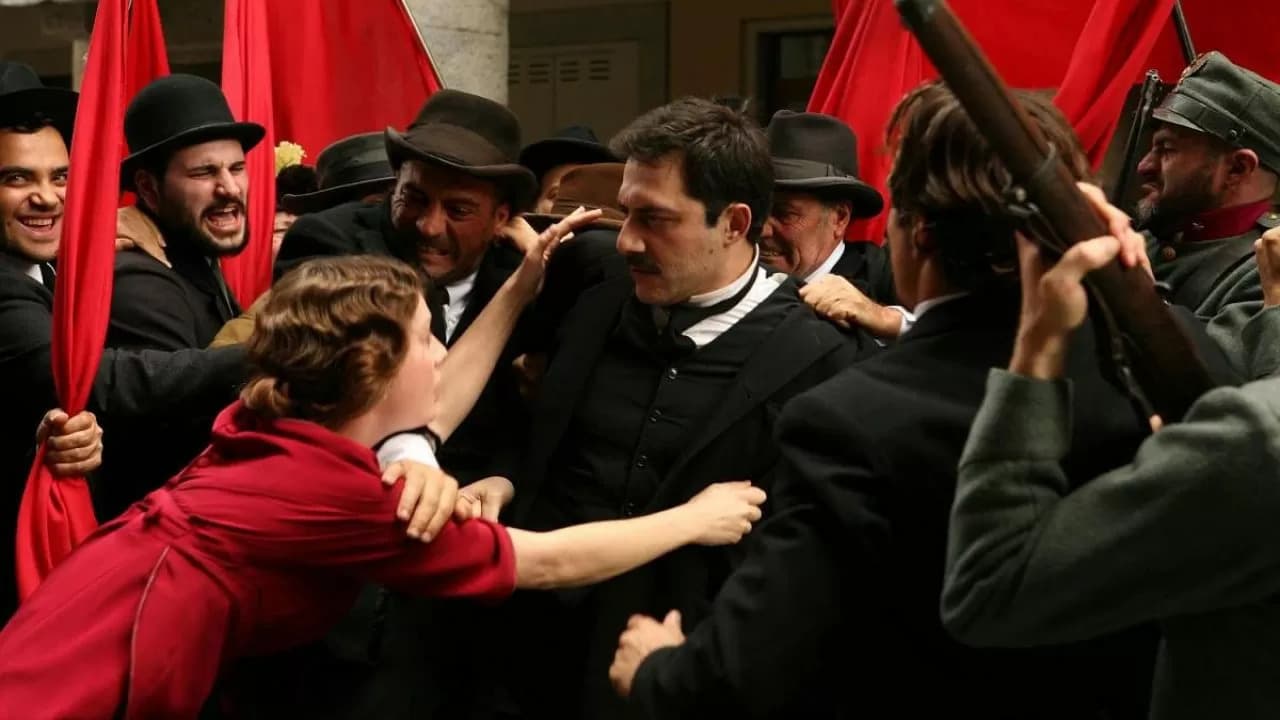StunnaKrypto
Self-important, over-dramatic, uninspired.
Grimossfer
Clever and entertaining enough to recommend even to members of the 1%
Payno
I think this is a new genre that they're all sort of working their way through it and haven't got all the kinks worked out yet but it's a genre that works for me.
Phillipa
Strong acting helps the film overcome an uncertain premise and create characters that hold our attention absolutely.
Tim Kidner
I'm afraid to say that I'd not encountered Italian director Marco Bellochio or his work before and bought this DVD as it was part of 2 for £10 offer and it looked the most interesting the shop had.I wasn't disappointed but would say that for most viewers, myself included, that it's the human story here that holds most interest. I'm not an expert in, nor wish to know the exact history surrounding its background, except, the fact that we are dealing with an infamous Italian Fascist leader and his first son and wife. These details are essential and placing them in a time-frame via newsreels is useful.It may be that the Italians needed a film themselves about this obviously dark aberration in their home history and I guess that it does that satisfactorily, though I'm no position to know as to how accurate it is.I, for one didn't feel it too long; I was soon aware that one & 3/4 hours had been chalked up, for instance. Giovanna Mezzogiorno puts in a magnificent and honest performance as the rejected mother and wife and Filippo Timi makes a fair stab as a young Mussolini. The film has a great, semi-operatic score that's always in tune with the emotions and turmoils and helps to sweep proceedings along. The cinematography too is very good, suitably moody and majestic.Incarceration into decades of mental institutions, presumably on the order of Mussolini and the Party, a sane and healthy Ida Dalser fights tooth and nail to see her son again and for her very freedom. In a perpetual ritual of having her silenced she tries to keep hold of her dignity and sanity and tries any means possible to aid her, except she will not deny that she is wife of Mussolini, who is now "saving Italy" (and is having more important things to do than be troubled by a deluded mad-woman).I cannot think how it could be greatly improved and was a good, not great film, that tells a story that does not touch me in the historical sense but as a human one, certainly does.
faraneh-abbassian
the way Bellocchio show different aspects of dictator Mussolini' personality during a love story is great.I like the way he told his film story from beginning Mussolini was editor of avant and the steps he climb up to become great Mussolini the leader of Italia.by using parts of Documentary movies and the main title of newspapers through the Mussolini private life,Bellocchio create parallel lines of History and Politics and their affects on his characters lives.the way Ida looking after his son recall me (changeling) by Clint Eastwood although I like this Italian one more.in my opinion the best parts of movie is the last part.when Mussolini make a deal with God in 5 minuets and the smiley face of Ida looking at him and longing love for him.Mussolini forgot something that day.maybe 5 minuets for God last 30-40 years for us. I recommend this movie highly to everyone to know the irresponsible hands took the responsible of many peoples's destiny.
Yaaatoob
Marco Bellocchio's 'Vincere' is a dark and powerful film that follows Benito Mussolini's rise to power through the eyes of his first wife, Ida Dalser, who was seduced and then betrayed by Mussolini as he abandoned her and their son on his way to becoming Italy's dictator, ultimately disavowing any knowledge of their existence. The film starts with a stylish and operatic punch as a young Mussolini (played by Filippo Timi) veers away from socialism to form the National Fascist Party, the narrative speeding through historical events at a steady pace for the first half hour, interposed with newsreel headlines and archive footage projected on screen in a manner reminiscent of Lars Von Trier's 'Europa'. Abruptly the film shifts focus to Ida Dalser (Giovanna Mezzogiorno) as she is forcibly separated first from Mussolini, then from her own son and finally from the outside world as Mussolini attempts to cover up any trace of their marriage and has Dalser committed to an insane asylum. Not only does this present a shift of perspective, but it's a stark shift in the film's tone too. Gone are the stylish and grandiose themes of revolution, seduction and upheaval, replaced by a tragic and startling performance from Mezzogiorno as her character descends further into mental illness. Filippo Timi provides a frenzied and forceful portrayal of both 'Il Duce' and the adult version of the dictator's unrequited son, but it's Giovanna Mezzogiorno's career defining performance that steals the show, showing Dalser as strong, resilient and somewhat naive in outset, harrowed, resigned and on the very brink by the film's close. Mezzogiorno's role is somewhat allegorical of the film as a whole, as like Italian society Dalser too was seduced and subsequently betrayed by the charm of the fierce and intelligent Mussolini. Ultimately with 'Vincere' Bellocchio and his lead actors present a mature and thought provoking look at one of the most clouded stories of Fascist Italy's past with an uncanny sense of style and dramatic flair and punctuated by the film's wonderful classical score. Remarkable.
Eternality
In competition for 2009's Palme d'Or, Vincere is a new film by Marco Bellocchio. It is set in the early 20th century in Italy, during a dangerous time of oppression and political revolution, which cumulated in the evil that was Fascism. The story is not about the horrors of Fascism per se or how it rose to become an ideology matched in its ghastliness only by Nazism, but of its dictator Benito Mussolini and his private life.Vincere tells the true story of Mussolini (Filippo Timi) and Ida Dalser (Giovana Mezzogiorno), his secret lover whom he had a passionate but somewhat sordid affair with. In the film, Dalser gives birth to a son who is taken away from her. She is also sent to a mental institution for claiming that she is the "rightful wife" of Mussolini; the latter is married and denies the affair with Dalser.Much of Vincere revolves around Dalser, whom is portrayed as a sympathetic figure, a person who loved and trusted Mussolini with all her heart, but ended up suffering the ignominy of being a "prisoner of a vile dictator". Mezzogiorno's performance is noteworthy. She switches effortlessly from a seductive woman who oozes sexual allure (she appears completely nude in a number of shots) to a frustrated person devoid of the freedom to pursue personal justice.Timi also plays Mussolini with a fierce affection. But he fizzles out in the second half of the picture after Bellocchio rightly gives more screen time to Mezzogiorno. Even though the core of Vincere rests upon the relationship (or lack of) between Mussolini and Dalser, the political themes of the film remain in the consciousness of the viewer throughout.Bellocchio inserts old black-and-white footages of history into the film, drawing our attention to the fervent and violent political and nationalistic attitudes of that era. The shouts of "Italia! Italia!" and the real Mussolini giving a powerful speech about war are, at the very least, disquieting. Matched with a loud, rousing score with lots of brass and choir, the film is quite strong in creating a mood of paranoia.Vincere somewhat ends too quickly. Even for a film that is slightly longer than two hours, it seems like more exposition is warranted and would have been greeted more positively than not. Thus, the film feels incomplete but it is still a well-made film with its cinematography, in particular, an aspect to appreciate.It may seem ironic but in Vincere's most emotional sequence, Bellocchio uses clips from Chaplin's The Kid (1921). In The Kid, Chaplin's character is devastated when his young son is taken away from him by the state. Dalser, who watches the film in an open-air screening, draws strength from it in the hope that she will one day see her son again.Bellocchio's Vincere is a decent entry into the Palme d'Or selection, but it is by no means a stunning piece of cinema. The private story of Mussolini (or rather Dalser's) is compelling enough to last the two hours, though it would have been better received with a more complete approach.SCORE: 7.5/10 (www.filmnomenon.blogspot.com) All rights reserved!

